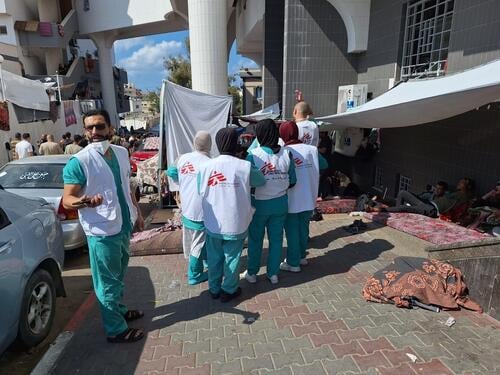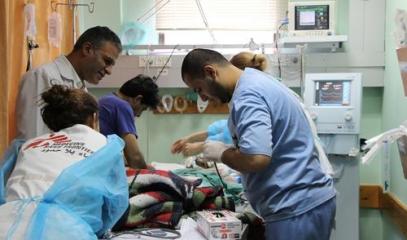War and health emergency: civilians face 'perfect storm' in Gaza
A spokesman for the Palestinian Ministry of Health warns that Gaza faces “the spread of epidemics, infectious diseases, malnutrition and the lack of clean drinking water and personal hygiene.” About 327,000 cases of infectious disease have been detected. The situation is having catastrophic repercussions on children’s health. Women are forced to deliver babies at home because it is too dangerous to go to a hospital.
Jerusalem (AsiaNews) – Conflict-related violence, siege and epidemics resulting from desperate sanitation conditions are creating a "perfect storm" for the people of Gaza.
Those who survive bombs and bullets – which have already claimed more than 18,600 lives, mostly civilians, "collateral" victims of the war between Israel and Hamas – are increasingly at risk of contracting diseases with often lethal consequences due to lack of doctors, drugs, and medical facilities.
Ashraf Al-Qudra, spokesman for the Palestinian Ministry of Health in Gaza, warns of “the spread of epidemics, infectious diseases, malnutrition and the lack of clean drinking water and personal hygiene.”
At a press conference yesterday, he reported that health officials have detected some 327,000 cases of infectious disease, as people coming to health centres from shelters, noting that the actual number is likely much higher.
Children’s vaccinations have also completely run out, he added, which will have catastrophic health repercussions on children’s health, already compromised by the war, and will facilitate the spread of viruses, especially among the displaced in overcrowded shelters.
For this reason, he warns, international institutions must intervene quickly to provide the necessary vaccinations and ensure access in all areas of the Gaza Strip to prevent the unfolding health disaster.
For James Elder, chief spokesperson for the UN children's fund (UNICEF), “The perfect storm for disease has begun. Now it's about, 'How bad will it get?'"
The situation is so alarming since most of Gaza’s medical facilities have been compromised; 21 of the Gaza Strip's 36 hospitals are closed, 11 are partially functional and four are minimally functional.
As a result, diseases are spreading. From 29 November to 10 December, cases of diarrhoea in children under five jumped 66 per cent to almost 60,000 cases. But according to the World Health Organisation (WHO), the numbers were inevitably incomplete.
Dr Ahmed Al-Farr, head of the paediatric ward at Nasser Hospital in Khan Younis, southern Gaza, told Reuters that his ward is overrun with children suffering from extreme dehydration, which causes kidney failure in some cases, while severe dysentery is four times higher than normal.
He is aware of at least 30 cases of Hepatitis A in Khan Younis in the past two weeks. “The incubation period of the virus is three weeks to a month, so after a month there will be an explosion in the number of cases of Hepatitis A.”
Marie-Aure Perreaut, emergency medical coordinator for Médecins sans Frontières[*] (MSF) in Gaza, said two things were now inevitable.
“The first is an epidemic of something like dysentery will spread across Gaza, if we continue at this pace of cases, and the other certainty is that neither the Ministry of Health nor the humanitarian organisations will be able to support the response to those epidemics," she warns.
The United Nations World Food Programme reports that 83 per cent of people who have moved to southern Gaza do not eat enough food and show signs of malnutrition, especially children.
In a situation of extreme emergency and precariousness, childbirth – which already comes with risks and dangers in protected environments – can become extremely complicated without electricity or equipment.
Middle East Eye has reported one such case. A nurse used paper scissors and plastic clothes pegs and the dim light of mobile phones amid the explosions of Israeli bombing, to help her sister deliver her baby.
For family members, the risks of venturing outdoors to reach the nearest hospital were too high, opting instead for a home birth thanks to 25-year-old Nour Moeyn who took charge.
"At around 1 am, Aya's labour pain started and it was very strong so that she could not bear it. Within half an hour, the baby's head started emerging and we had to act immediately,” said Nada Nabeel, Aya’s sister-in-law.
“Of course, we could not even think of going to the hospital as it would have been a death sentence for Aya, the baby, and everyone who would accompany her. The bombing was intense and we could hear Israeli tanks moving in the nearby areas,” Nabeel added.
Although Moeyn assisted doctors delivering babies and performing caesarean surgeries in the past, she had never done it alone. “But she decided to do the job, or else her sister and the baby would die,” Nabeel explained.
(Photo from the website of Médicins sans Frontières)
[*] Doctors without Borders.
01/03/2024 13:55
06/11/2009








.png)










